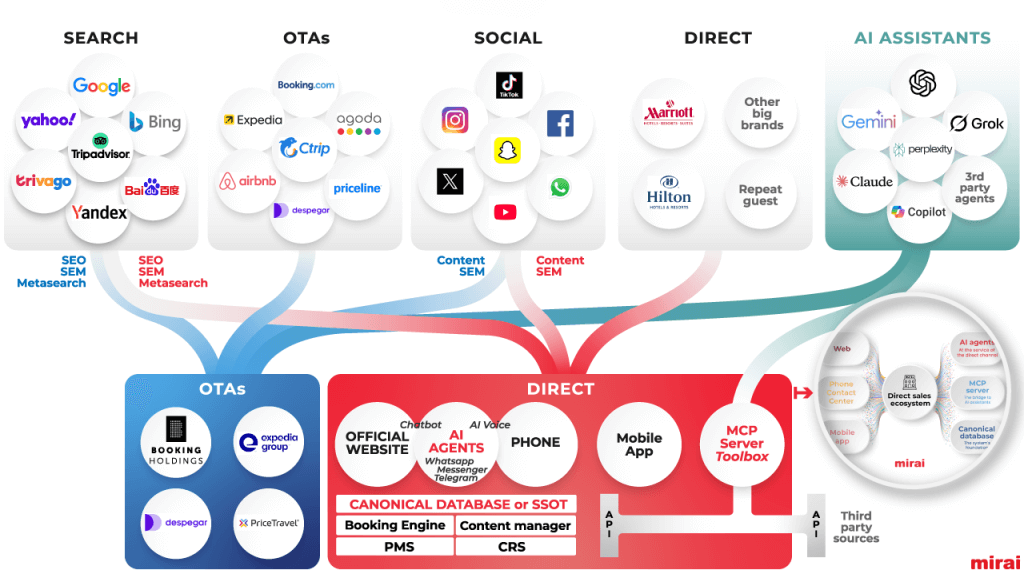
Imagine a world where your hotel knows what a guest wants even before they do.
NB: This is an article from RateGain
A world where your pricing strategy is not just about numbers, but about understanding choices, dreams, and the urge to travel. A world where your revenue management and marketing teams work hand in hand to craft personalized offers that guests can’t resist.
Subscribe to our weekly newsletter and stay up to date
Sounds utopian right? Well, with Artificial Intelligence (AI), this dream is becoming a reality.
Over the last few months, we have seen ChatGPT, Bard and other travel-technology companies use Large Language models to fundamentally alter the way travelers looked for inspiration, searched for options and how they planned travel. The two-decade old process of searching for options in silos finally appears to be broken – and a near human like conversational experience is now being created where travelers can share an abstract vision of the type of travel they want to experience and the LLM powered bots will share the closest matches to their vision.
Personalizing Pricing with AI
AI is enabling a new level of personalization in the hospitality industry. By analyzing vast amounts of data quickly, AI can understand individual preferences, needs, and the urge to travel, allowing hotels to tailor their offerings to each guest. This level of personalization enhances the guests’ experience, leading to increased customer satisfaction and loyalty.
For instance, AI when coupled with a language model, can not only understand past booking behaviors but also preferences for future stays. This could range from their preferred room type and amenities to their dietary preferences and activities of interest. By personalizing the guest experience in this manner, hotels can not only enhance guest satisfaction but also maximize their revenue by upselling personalized services and offerings.
While hoteliers might see this as an additional layer of complexity, the right way to see it as an opportunity to differentiate their offerings not only within the hotel, but even before the guest has made the decision to book with them. The level of customization also allows them to charge a premium depending on the type of property the revenue management team is handling.
Making TRevPAR a success with AI
AI as most of you might understand is the layer that sits on top of all the data that is collected. This collected data allows the AI to stay informed, build context and suggest solutions or alternatives that can work in the real world. An application of that use case in hospitality is providing recommendations to end travelers and helping them have better experience, as well as connect with PMS systems to understand and tackle guest queries.
For instance, an AI assistant can understand a user’s query, provide relevant information, and even suggest personalized recommendations. This not only enhances the user experience but also reduces the workload on customer service teams, allowing them to focus on more complex tasks.
With AI being able to provide prompt response and service, this allows the opportunity to upsell and create room for generating higher revenues.
However, based on consumption patterns – in the future when guests return to book with a certain chain, the chain can nudge the user to add on the ancillaries he ordered at a discount – ensuring that the extra revenue is guaranteed as well as the guest also feels they are able to get a good price for the add on.
In addition to this, using AI hotels can drive more traffic to their apps or website as that is where you can serve the offer, and not on the OTA.
The Blurring Lines between Marketing and Revenue Teams
With the rise of hyper-personalization, the lines between revenue management and marketing are blurring. Revenue managers are no longer just setting prices based on supply and demand. They are now working closely with marketing teams to understand what the right offer is for each individual customer.
For instance, by analyzing a customer’s booking history and online behavior, revenue managers and marketing teams can determine the types of offers and promotions that the customer is most likely to respond to. This could range from discounted rates and package deals to personalized add-ons and services.
In this context, the role of revenue managers is evolving from simply setting prices to crafting personalized offers that maximize both customer satisfaction and revenue.
So, What can You Do?
As AI continues to evolve, so will the role of revenue managers as the trip planning and booking process undergoes a massive change.
Revenue managers will need to understand and leverage AI to craft personalized pricing strategies, work closely with marketing teams to understand customer behavior, and make data-driven decisions to maximize revenue.
Remember, the advent of AI is not a threat to revenue managers, but an opportunity. It’s an opportunity to enhance their strategies, provide more personalized experiences to guests, and ultimately, drive more revenue. As we move into the future, the role of revenue managers will be more important than ever, and those who can adapt and leverage AI will be at the forefront of the industry.




